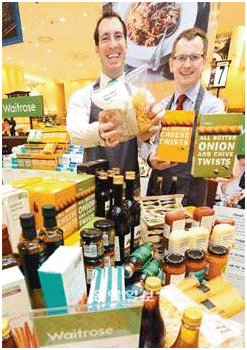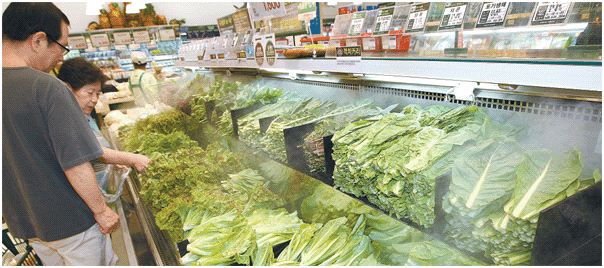
Market Information > 한국 농식품 시장뉴스
한국 농식품 시장뉴스
August 31, 2012
2012.08.31
1. BILATERAL/MULTILATERAL ISSUES
<8/27/2012> S. Korea, China make headway in FTA talks [English, CSY]
http://english.yonhapnews.co.kr/business/2012/08/27/67/0502000000AEN20120827005900320F.HTML
Summary: South Korea and China have made progress in their free trade talks with both countries agreeing on removing tariffs on products within 10 years after the implementation of their free trade accord, Seoul's trade ministry said Monday. During the three-day meeting that ended Friday in Weihai, a city in China's eastern Shandong Province, both sides also agreed to remove tariffs on so-called sensitive products in 10 years after the deal takes effect, according to the ministry. Agriculture and fisheries are considered to be the most sensitive sectors for South Korea, while China categorizes its manufacturing industries, which include the automobile, machinery and oil sectors, as sensitive.
2. ECONOMIC ISSUES
Food prices feared to spike following typhoon [English, CSY]
http://english.yonhapnews.co.kr/business/2012/08/28/66/0502000000AEN20120828008200320F.HTML
Summary: Prices of vegetables, fruits and other agricultural products are likely to surge as powerful Typhoon Bolaven reduces the harvest of farm produce, officials said Tuesday. Bolaven, the strongest typhoon in almost a decade, hit the western part of the country, bringing fierce winds and high waves earlier in the day, destroying hundreds of orchards in South Korea and leading to premature fruit drops. "It is difficult to estimate the damage at the moment," said an official at the agriculture ministry. "Prices of fruits and vegetables are hit hardest among others, and the harvests are likely to drop." Prices of vegetables and other fresh foods in South Korea were already high in the wake of unusual heat waves that hit the country late last month.
3. MARKETING ISSUES
Shinsegae Department Store Launches Private Brand Products Sourced from Waitrose, a UK Supermarket Chain [Korean, OSY]
http://news.donga.com/3/all/20120829/48970848/1

Paris Baguette Opens 100th Store in China [Korean, OSY]
http://www.hankyung.com/news/app/newsview.php?aid=2012083094101
Summary: Paris Baguette, the leading bakery store chain in Korea, announced that its 100th store in China will open on August 31 in Beijing. Paris Baguette added that it aimed to increase its stores in China to 500 by 2015.
‘Choco-Pie’ to Increase Price by 25 Percent [Korean, OSY]
http://www.hankyung.com/news/app/newsview.php?aid=2012083001291
Summary: Orion Co. announced to its customers that It would increase the ex-factory price of ‘Choco-Pie’, one of the most popular confectionery products in Korea, by 25 percent from September 14. Many other major snack and confectionery products have recently announced stiff price increases.
4. OTHER MISCELLANEOUS ISSUES
Greens give shoppers the blues[English, OYS]

People shop for lettuce and sesame leaves at a large discount store in Seoul yesterday after their prices spiked due to fears concerning Typhoon Bolaven and a prolonged drought and heat wave this summer. According to Garak Market, a large wholesale food market in Songpa District, southern Seoul, the wholesale price of four kilograms (8.8 pounds) of lettuce shot up 7.8 percent from two months earlier to stand at 98,157 won ($86.60). [YONHAP]
Korea gearing up to boost seeds exports [English, CSY]
http://www.koreatimes.co.kr/www/news/biz/2012/08/123_118534.html
Summary: Korean farmers pay hundreds of millions of dollars each year in royalties to foreign seed producers for growing grains and other commercial crops. The amount is growing at an explosive pace year after year as they cultivate more flowers, vegetables and other high-valued commercial plants, while shying away from rice and other traditional crops. To help reduce such royalty payments and find a new growth engine in the farming sector, the government has decided to foster the domestic seed industry by investing $2 billion over the next 10 years. The state-run Korea Seed & Variety Service is at the center of such efforts, playing a crucial role in the research and commercialization of various horticultural and agricultural seeds.
The information in this report was compiled by the Agricultural Trade Office (ATO) at the U.S. Embassy in Seoul, South Korea. The press summaries contained herein do NOT reflect USDA, the U.S. Embassy, or other U.S. government agency official policy or view point. U.S. food exporters can learn more about market opportunities in South Korea by reviewing ATO Seoul’s Exporter Guide and other reports available at www.fas.usda.gov by clicking on “attaché reports”.
Agricultural Trade Office, U.S. Embassy - Seoul
Tel: 82-2-6951-6848 Fax: 82-2-720-7921
Email: atoseoul@state.gov